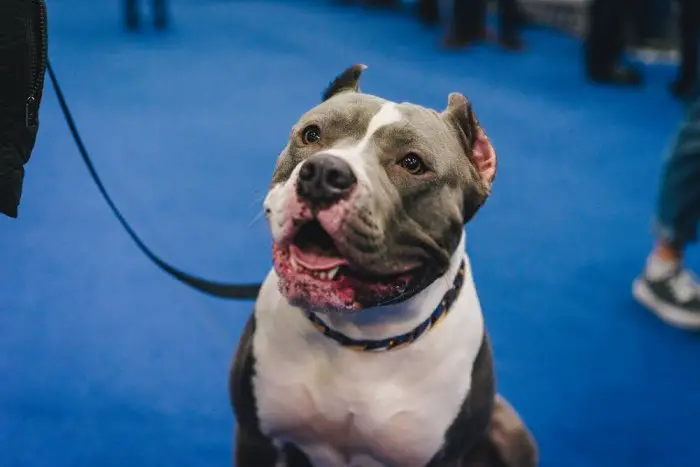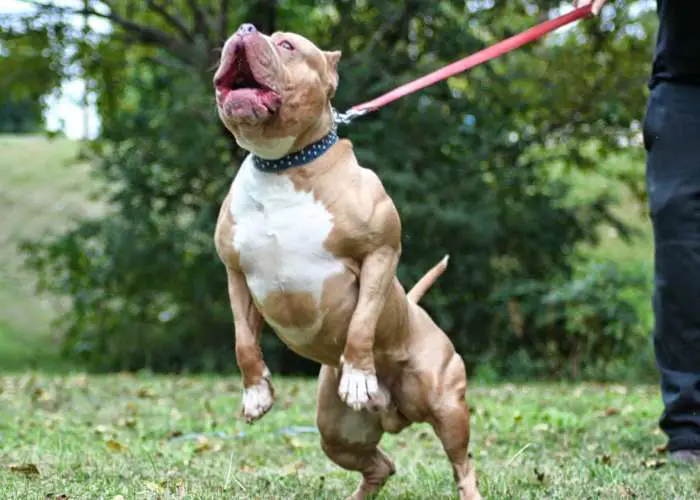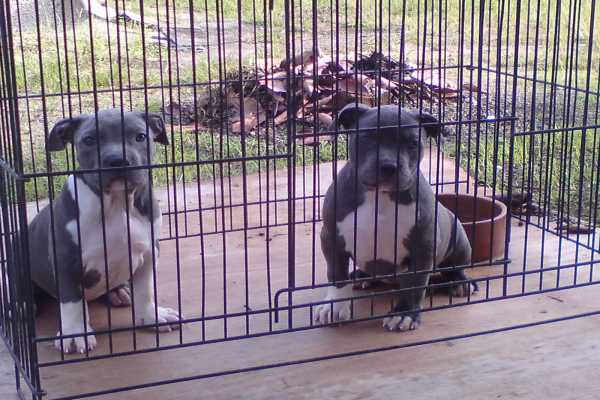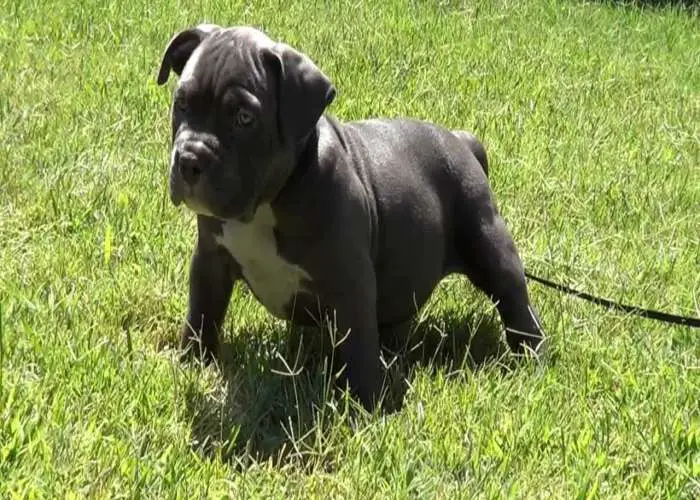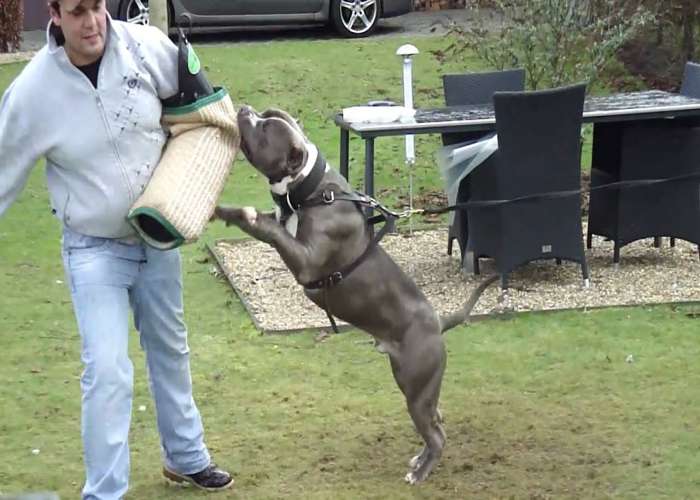
American Bully are powerful dogs that can intimidate the faint-hearted. These dogs are affectionate, loving, playful, and gentle by nature. However, some dogs are not aware of their strength and the fearsome appearance they pose. Thus, training an American Bully is an absolute must for its owners. Providing early training and socialization will mold your pet’s behavior and temperament positively. More so, these dogs need to recognize owners as their leader and that they need to be disciplined and obedient.
But how hard can it be to train a Bully dog? According to experts, the job of training a Bully requires immense patience and determination. As an owner, you may have an easy or challenging time training your dog. Ideally, training should start while they are still puppies. Older dogs are more or less set in their mindset and attitude; thus, training them can be harder.
Additionally, Bullies are just like any other dogs. They will make mistakes when training. If you are not up for the job, seek a trainer who has experience in handling American Bully training. Mature ones will require extra patience during training while puppies have a short attention span, so keep training short.
Here are some pointers to keep in mind when training an American bully
Teaching Bullies to Obey Basic Commands
Training dogs is not just about teaching them tricks. It should focus on educating your pet to behave appropriately at all times. You must show your dog to recognize your voice and obey basic commands like stay, sit, or come. These simple commands can halt a dog’s undesirable behavior when they learn to follow it.
When your pet behaves well in the home, during walks, or car rides, it will be more comfortable and enjoyable for you and your pet. Ideally, you must take in your American Bully to feel that they are one of the family, and you are the leader. Pets must feel useful and wanted. Use training sessions to spend time with them, especially while they are growing.
Other basic commands they should know are sitting and responding to their name. Training sessions can be five to ten minutes each day. It is also essential to teach them to walk properly beside you without pulling on the lead. It is best to manage unwanted behaviors in dogs while they are still puppies. If you don’t deal with it early on, they will be difficult to rectify later on.
Always remember that the American Bully dogs are brilliant. Spend time with them and make training fun and enjoyable for them to learn quickly. As much as possible, be consistent in your commands and patient in teaching.
Related Post: Best Toys for Pitbulls and American Bully
Using Positive Reinforcements
Always use positive reinforcement when training any dog breed. This method involves rewarding positive behavior and the simple “no” when it does something that is not ideal. Never shout or be violent towards your Bully.
During training, the owner/trainer needs to know the right and wrong behavior. If your Bully follows or does as you command, you should give it a treat. The more you reward your pet, the greater will be his positive responses to you. Punishing dogs physically can be viewed by your pet as a “reward” for their bad behavior. Thus, taking alternative steps to prevent undesirable habits is your next best move. For instance, you can take them outside for potty training. Otherwise, you can give them chew toys to stop them from chewing on shoes.
Teaching Social Skills for Other People and Pets
Typically, American Bully dogs are very social pets. Growing up surrounded by family is an ideal starting point for honing a Bully’s socialization skills. Training them to behave well with other people and pets can start with regular outdoor walks. It is an excellent way to exercise your Bully and keep them physically healthy and happy. Outdoor walks are also the perfect opportunity for leash training and socializing with other dogs.
You can introduce your pet to other people like your neighbors, people you meet on your walks, pets, and others. You can also start training them to get used to the idea of visiting a veterinarian.
However, it is best to skip socialization training if your pup is not yet vaccinated. Puppies go through a biting and chewing phase. Thus, it might not be a good idea to expose them to other people and pets when they are not yet vaccinated.
You might be interested in our guide about best pitbull dog harness
Potty Training
Another crucial training that American Bullies need is to learn potty properly. Potty training them early on will make life easier for everyone in the family. Your dog should learn that relieving indoors is not a good idea. This training can take a lot of hits and misses; thus, you have to make extra effort and patience. Observe your pooch if they are sniffing, circling, and squatting. These are signs that they are likely to pee or poop. Take your pet outdoors or to its potty area and wait until they finish to clean-up the mess. If your pooch does a potty during a walk, clean up immediately, especially if it is a public area.
Crate Training
Crate training is an ideal way of teaching obedience to American Bullies. It also gives them a safe and comfortable space of their own so they can relax. Keep in mind that the use of crates is not a punishment. Instead, it should be a secure place for them to rest and sleep. Make sure to read our review on the best leash for Pitbulls
Make sure that it is spacious enough for the dog to move around. Moreover, crates should allow them to watch what’s going on. Never force them inside the crate. Encourage your pet to explore the crate by putting blankets, toys, and some food. Once they feel comfortable inside the crate, feed them inside it with the open door. You may close it when your pet feels secure after feeding. Increase their stay gradually until they feel comfortable enough to sleep inside the crate.
So What is the Ideal Age for Training an American Bully Dog?
Training an American bully when they are all grown up could be an intimidating task. They can be mule-headed goofballs that will be happy to defy you during training. Thus, it is advisable to train American bullies when they are still puppies. The best age for teaching them is while they are two to three months old. During this phase, Bullies must start training so that they will behave appropriately in all aspects of life.
Puppies are also easier to train because they quickly follow the commands from their leader. Bully puppies also associate training to be positive experiences when it is fun and entertaining. Here are some tips to help you get around basic training for your puppies.
For Housebreaking
Start housebreaking training as soon as you take your new Bully puppy home. Puppies typically lack control over their bladder, and it can mess up your home when they are not trained immediately. Use housebreaking tools like a small potty patch, crate, or install doggy access to a potty yard or litter box.
With proper potty training, you won’t have to worry about stepping on dog poop or pee around your home. Your Bully will know where to go when they need to relieve themselves.
Household Rules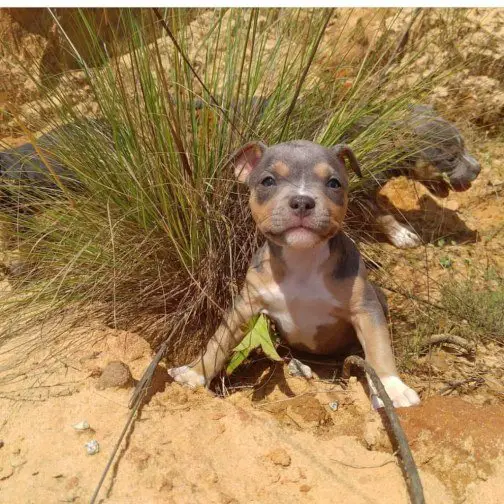
As the newest member of the family, a Bully puppy should first learn that there are rules around the house. Puppies may find some activities entertaining in fun, but when they are dissuaded from doing it, they may become troublesome habits in the future. Make to stop your Bully puppy when they exhibit unwanted behaviors like:
- Shredding papers
- Barking excitedly during meal preparation
- Bullying other dogs
- Jumping on your furniture
- Loud, unnecessary barking
- Snatching food
- Doing potty inside the house
A straightforward way to teach them to behave and listen to your command is during their meals. Puppies tend to jump excitedly and be noisy when they are about to get their food. So before giving them their food bowls, command them to “sit” and wait until they sit and remain calm. Once they comply, you can praise them and give them their food.
Handling Training
Although Bullies are very friendly canines, they might welcome others touching them physically. Often puppies shy away from touchy strangers and objects being handled. Thus, it is necessary for you as the owner to train your Bully to accept being handled by others. It is a social skill they need to learn while they are young.
When they are comfortable when handled, grooming and veterinary visits become an easier feat. Your Bully will grow up used to having their nails clipped, ears checked, vaccinated, and groomed. Putting on a collar and tick removal also becomes hassle-free with dogs that are used to handling.
Use Clicker for Your Training
Clicker training works well for Bully puppies in marking desired behaviors with a food treat. Using a clicker allows them to do some mental exercises because they try to remember the behavior that gets the reward. So start with simple commands like “watch me,” use the clicker and give your Bully pup a treat when it looks at you. Your dog learns to focus on you while you spend a great bonding activity during training.
Clicker training requires precise timing to train Bully puppies. With the right timing, your puppy learns which exact behavior is rewarded. Avoid praising too soon or too late. Soon you can also master the skill of proper timing. For example, if you reward it as it gets up from a sit, it may think that standing is what earns the reward. Thus, focus on what your puppy is doing at the exact moment that you give it praise.
Make Training Quick and Fun
Puppies lose interest when they hear the same thing, so try to vary the tone of your voice when teaching them cues. Make training sessions fun and quick. Ideally, it should start for a few minutes and gradually increase to 10 minutes or more. You can train them several times a day. You might feel frustrated at some point, but you should always end the session with a happy attitude.
Use flavorful and moist food tidbits when using food as a reward for performing a new behavior. Food rewards should be different from their usual diet. You can use hotdog pieces, cheese, or chicken strips.
Training puppies takes time, so stay positive and patient. With practice, treats, and time praise, your Bully puppy will soon learn all your cues.
Patience and Consistency
Whatever tricks or cues you teach your dog, always praise their good behavior. Positive reinforcement is an effective method to reward behavior that you like and ignore those you don’t like.
The key to using positive reinforcement in training your pooch is to remain consistent and patient. It can be frustrating when your Bully puppy disobeys your command. Keep in mind that dogs read body language better than words, thus always project and speak positively.
Whenever you feel frustrated with your puppy, remember that it is doing its best. So relax and start again on a happy note. Your Bully dog will pick up your smile and excited note, so they’ll look forward to what you have in store for them.
Conclusion
Training your American Bully should not just be about discipline and gaining control over them. Each session should be a bonding time for you both. Make it fun and exciting so that your pooch associates training as a positive experience. Prepare tasty treats and keep them varied, so it is always appealing for your pooch. They will look forward to their sessions as a wonderful bonding time with you.
Ideally, basic dog training such as housebreaking, crate training, socialization must start while they are still puppies. Growing up, they learn good and bad behavior with your guidance and continuous training. As they grow into adult dogs, your bond will grow stronger, and you will be proud to showcase your success through your well-trained Bully.
Conclusion
Training your American Bully should not just be about disciple and gaining control over them. Each session should a bonding time for you both. Make it fun and exciting so that your pooch associates training as a positive experience. Over time, your bond will grow stronger, and you will be proud to showcase your success through your well-trained Bully.
“Adopting a pet often brings several questions, fears, and apprehensions. That’s why the HomeoAnimal team, dedicated to improving the health of animals naturally, has worked many hours interviewing 200 shelters and rescues, into getting their best advice.

